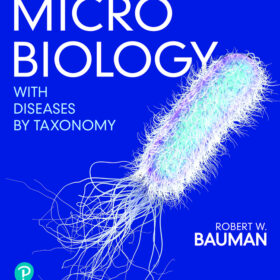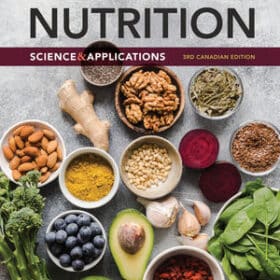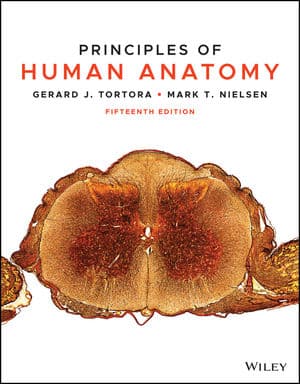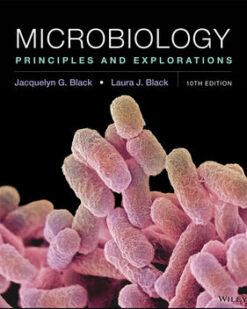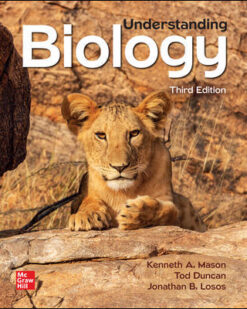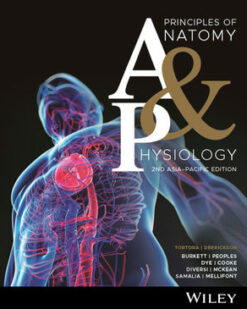Description
3.8 Nervous Tissue 92
3.9 Aging and Tissues 94
Key Medical Terms Associated with Tissues 95 / Chapter Review 95 / Critical Thinking Questions 97 / Answers to Figure Questions 97
4 Development 98
4.1 Principles of Development 99
4.2 Embryonic Period 100
First Week of Development 100
Fertilization 100 / Cleavage of the Zygote 101 / Blastocyst Formation 101 / Implantation 102
Second Week of Development 104
Development of the Trophoblast 104 / Development of the Bilaminar Embryonic Disc 105 / Development of the Amnion 106 / Development of the Umbilical Vesicle 106 / Development of Sinusoids 107 / Development of the Extraembryonic Coelom 107 / Development of the Chorion 107
Third Week of Development 107
Gastrulation 107 / Neurulation 110 / Development of Somites 110 / Development of the Intraembryonic Coelom 110 / Development of the Cardiovascular System 110 / Development of the Chorionic Villi and Placenta 112
Fourth Week of Development 114
Fifth Through Eighth Weeks of Development 116
4.3 Fetal Period 117
4.4 Maternal Changes During Pregnancy 120
4.5 Labor 120
Key Medical Terms Associated with Development 122 / Chapter Review 123 / Critical Thinking Questions 124 / Answers to Figure Questions 124
5 The Integumentary System 125
5.1 Structure of the Skin 126
Epidermis 126
Stratum Basale 126 / Stratum Spinosum 129 / Stratum Granulosum 130 / Stratum Lucidum 130 / Stratum Corneum 130 / Cornification and Growth of the Epidermis 130
Dermis 131
Blood Supply of the Integumentary System 132
The Structural Basis of Skin Color 133 / Tattooing and Body Piercing 134
Subcutaneous Tissue 134
5.2 Accessory Structures of the Skin 134
Hair 135
Anatomy of a Hair 136 / Hair Growth 138 / Types of Hairs 138 / Hair Color 138
Skin Glands 139
Sebaceous Glands 139 / Sudoriferous Glands 140 / Ceruminous Glands 141
Nails 141
5.3 Types of Skin 143
5.4 Functions of the Skin 143
5.5 Development of the Integumentary System 146
5.6 Aging and the Integumentary System 146
Key Medical Terms Associated with the Integumentary System 148 / Chapter Review 149 / Critical Thinking Questions 150 / Answers to Figure Questions 151
6 Bone Tissue 152
6.1 Functions of Bone and the Skeletal System 153
6.2 Types of Bones 153
6.3 Anatomy of a Bone 154
6.4 Bone Surface Markings 156
6.5 Histology of Bone Tissue 156
Compact Bone Tissue 158
Spongy Bone Tissue 160
6.6 Blood and Nerve Supply of Bone 162
6.7 Bone Formation 163
Initial Bone Formation in an Embryo and Fetus 163
Intramembranous Ossification 163
Endochondral Ossification 163
Bone Growth During Infancy, Childhood, and Adolescence 166
Growth in Length 166 / Growth in Thickness 167
Remodeling of Bone 167
6.8 Fractures 170
6.9 Exercise and Bone Tissue 173
6.10 Aging and Bone Tissue 173
6.11 Factors Affecting Bone Growth 173
Key Medical Terms Associated with Bone Tissue 175 / Chapter Review 175 / Critical Thinking Questions 176 / Answers to Figure Questions 177
7 The Skeletal System: The Axial Skeleton 178
7.1 Divisions of the Skeletal System 179
7.2 Skull or Cranium 181
General Features and Functions 181
Nasal Septum 200
Orbits 200
Foramina and Canals 202
Unique Features of the Skull 203
Sutures 203 / Paranasal Sinuses 203 / Fontanels 204
Cranial Fossae 206
Age- related Changes in the Skull 206
Sexual Differences in the Skull 207
7.3 Hyoid Bone 209
7.4 Vertebral Column 209
Normal Curves of the Vertebral Column 210
Intervertebral Discs 212
Parts of a Typical Vertebra 212
Vertebral Body 212 / Vertebral Arch 212 / Processes 214
Regions of the Vertebral Column 214
Age- related Changes in the Vertebral Column 214
7.5 Thorax 223
Key Medical Terms Associated with the Axial Skeleton 227 / Chapter Review 228 / Critical Thinking Questions 229 / Answers to Figure Questions 229
8 The Skeletal System: The Appendicular Skeleton 230
8.1 Skeleton of the Upper Limb 231
8.2 Skeleton of the Lower Limb 244
8.3 Greater and Lesser Pelves 250
8.4 Comparison of Female and Male Pelves 252
8.5 Comparison of Pectoral and Pelvic Girdles 252
8.6 Development of the Skeletal System 262
Key Medical Terms Associated with the Appendicular Skeleton 265 / Chapter Review 265 / Critical Thinking Questions 266 / Answers to Figure Questions 266
9 Joints 267
9.1 Joint Classifications 268
Ligaments 268
9.2 Fibrous Joints 268
Fibrous Joints 269
Sutures 269
Syndesmoses 270
9.3 Cartilaginous Joints 270
Synchondroses 270
Symphyses 270
9.4 Synovial Joints 271
Structure of Synovial Joints 271
Articular Capsule 271 / Synovial Fluid 272 / Accessory Ligaments, Articular Discs, and Labra 272 / Nerve and Blood Supply 274
Bursae and Tendon Sheaths 274
9.5 Types of Movements at Synovial Joints 274
Gliding 275
Angular Movements 275
Flexion, Extension, and Lateral Flexion 275 / Abduction, Adduction, and Circumduction 275
Rotation 276
Special Movements 278
9.6 Types of Synovial Joints 280
Plane Joints 280
Hinge Joints 280
Pivot Joints 280
Ellipsoid Joints 282
Saddle Joints 282
Ball-and-Socket Joints 282
9.7 Factors Affecting Contact and Range of Motion at Synovial Joints 283
9.8 Selected Joints of the Body 284
9.9 Aging and Joints 302
Key Medical Terms Associated with Joints 303 / Chapter Review 304 / Critical Thinking Questions 305 / Answers to Figure Questions 305
10 Muscular Tissue 306
10.1 Overview of Muscular Tissue 307
Types of Muscular Tissue 307
Functions of Muscular Tissue 307
Properties of Muscular Tissue 307
10.2 Skeletal Muscle Tissue Structure 308
Gross Anatomy of a Skeletal Muscle 308
Connective Tissue Coverings 310
Nerve and Blood Supply 310
Microscopic Anatomy of a Skeletal Muscle Fiber 310
Sarcolemma, T Tubules, and Sarcoplasm 311 / Myofibrils and Sarcoplasmic Reticulum 311 / Filaments and the Sarcomere 311
Muscle Proteins 313
10.3 Skeletal Muscle Tissue Function 317
Contraction and Relaxation of Skeletal Muscle Fibers 317
Sliding Filament Mechanism 317 / The Neuromuscular Synapse (Junction) 317 / The Contraction Cycle 320 / Excitation–Contraction Coupling 322
Muscle Tone 322
Isotonic and Isometric Contractions 325
10.4 Types of Skeletal Muscle Fibers 325
Slow Oxidative Fibers 325
Fast Oxidative-Glycolytic Fibers 325
Fast Glycolytic Fibers 326
10.5 Exercise and Skeletal Muscle Tissue 327
Effective Stretching 327
Strength Training 328
10.6 Cardiac Muscle Tissue 328
10.7 Smooth Muscle Tissue 330
10.8 Development of Muscles 332
10.9 Aging and Muscular Tissue 334
Key Medical Terms Associated with Muscular Tissue 334 / Chapter Review 334 / Critical Thinking Questions 336 / Answers to Figure Questions 336
11 The Muscular System 337
11.1 How Skeletal Muscles Produce Movements 338
Muscle Attachment Sites 338
Lever Systems 338
Effects of Muscle Fascicle Arrangement 340
Muscle Actions 340
Coordination Among Muscles 341
Structure and Function of Muscle Groups 342
11.2 How Skeletal Muscles Are Named 343
11.3 Principal Skeletal Muscles 343
Key Medical Terms Associated with the Muscular System 439 / Chapter Review 440 / Critical Thinking Questions 441 / Answers to Figure Questions 441
12 The Cardiovascular System: Blood 443
12.1 Functions of Blood 444
12.2 Physical Characteristics of Blood 444
12.3 Components of Blood 445
Blood Plasma 446
Formed Elements 446
12.4 Formation of Blood Cells 448
12.5 Red Blood Cells 450
RBC Anatomy 450
RBC Functions 450
RBC Life Cycle 452
Erythropoiesis: Production of RBCs 453
Blood Group Systems 453
12.6 White Blood Cells 454
WBC Anatomy and Types 454
Granular Leukocytes 454 / Agranular Leukocytes 455
WBC Functions 455
12.7 Platelets 457
12.8 Stem Cell Transplants from Bone Marrow and Cord Blood 460
Key Medical Terms Associated with Blood 460 / Chapter Review 461 / Critical Thinking Questions 462 / Answers to Figure Questions 462
13 The Cardiovascular System: The Heart 463
13.1 Location and Surface Projection of the Heart 464
13.2 Structure and Function of the Heart 466
Pericardium 466
Layers of the Heart Wall 468
Chambers of the Heart 469
Right Atrium 469 / Right Ventricle 471 / Left Atrium 471 / Left Ventricle 473
Myocardial Thickness and Function 473
Fibrous Skeleton of the Heart 473
Heart Valves 473
Atrioventricular Valves 474 / Semilunar Valves 476
13.3 Circulation of Blood 477
Systemic and Pulmonary Circulations 477
Coronary Circulation 477
Coronary Arteries 477 / Coronary Veins 478
13.4 Cardiac Conduction System and Innervation 480
Cardiac Conduction System 481
Cardiac Nerves 483
13.5 Cardiac Cycle (Heartbeat) 483
13.6 Heart Sounds 484
13.7 Exercise and the Heart 485
13.8 Development of the Heart 489
Key Medical Terms Associated with the Heart 491 / Chapter Review 492 / Critical Thinking Questions 493 / Answers to Figure Questions 493
14 The Cardiovascular System: Blood Vessels 494
14.1 Anatomy of Blood Vessels 495
Basic Structure of a Blood Vessel 495
Tunica Intima 495 / Tunica Media 497 / Tunica Externa 497
Arteries 497
Elastic Arteries 497 / Muscular Arteries 497
Anastomoses 498
Arterioles 498
Capillaries 499
Venules 500
Veins 500
Blood Distribution 503
14.2 Circulatory Routes—Systemic Circulation 504
14.3 Circulatory Routes—Hepatic Portal Circulation 548
14.4 Circulatory Routes—Pulmonary Circulation 549
14.5 Circulatory Routes—Fetal Circulation 550
14.6 Development of Blood Vessels and Blood 554
14.7 Aging and the Cardiovascular System 554
Key Medical Terms Associated with Blood vessels 556 / Chapter Review 557 / Critical Thinking Questions 558 / Answers to Figure Questions 558
15 The Lymphoid (Lymphatic) System and Immunity 559
15.1 The Concept of Immunity 560
15.2 Lymphoid (Lymphatic) System Structure and Functions 560
Structure 560
Functions 560
15.3 Lymphatic Vessels and Lymph Circulation 563
Lymphatic Capillaries 563
Lymphatic Trunks and Ducts 564
Formation and Flow of Lymph Plasma 565
15.4 Lymphoid Organs and Tissues 566
Thymus 567
Lymph Nodes 568
Spleen 570
Lymphoid Nodules 571
15.5 Principal Groups of Lymph Nodes 573
15.6 Development of Lymphoid Tissues 584
15.7 Aging and the Lymphoid System 584
Key Medical Terms Associated with the Lymphoid System and Immunity 586 / Chapter Review 587 / Critical Thinking Questions 588 / Answers to Figure Questions 588
16 Nervous Tissue 589
16.1 Overview of the Nervous System 590
Structures of the Nervous System 590
Organization of the Nervous System 590
Anatomical Organization 590 / Functional Organization 591
16.2 Histology and Functions of Neurons 592
Neurons 592
Parts of a Neuron 593 / Cell Body 593 / Nerve Fibers 594
Synapses 595
Neuromuscular Synapse (Junction) 595 / Synapses Between Neurons 595 / Neurotransmitters 596 / Structural Diversity in Neurons 597
16.3 Histology and Function of Neuroglia 598
Neuroglia of the CNS 598
Neuroglia of the PNS 600
Myelination 600
Gray and White Matter 602
16.4 Neural Circuits 603
16.5 Regeneration and Neurogenesis 604
Key Medical Terms Associated with Nervous Tissue 605 / Chapter Review 605 / Critical Thinking Questions 606 / Answers to Figure Questions 607
17 The Spinal Cord and the Spinal Nerves 608
17.1 Spinal Cord Anatomy 609
Protective Structures 609
Vertebral Column 609 / Meninges 609
External Anatomy of the Spinal Cord 611
Internal Anatomy of the Spinal Cord 613
17.2 Spinal Nerves 615
Structure of a Single Nerve 617
Organization of Spinal Nerves 618
Branches of Spinal Nerves 620
Intercostal Nerves 620 / Plexuses 620
Dermatomes versus Cutaneous Fields 620
17.3 Spinal Cord Functions 633
Sensory and Motor Tracts 633
Reflexes and Reflex Arcs 634
Key Medical Terms Associated with the Spinal Cord and the Spinal Nerves 636 / Chapter Review 637 / Critical Thinking Questions 637 / Answers to Figure Questions 638
18 The Brain and the Cranial Nerves 639
18.1 Development and General Structure of the Brain 640
Brain Development 640
Major Parts of the Brain 641
18.2 Protection and Blood Supply 641
Protective Coverings of the Brain 643
Cerebrospinal Fluid 644
Formation of CSF in the Ventricles 644 / Functions of CSF 648 / Circulation of CSF 648
Brain Blood Flow and the Blood–Brain Barrier 648
18.3 The Brainstem and Reticular Formation 649
Medulla Oblongata 650
Pons 652
Midbrain 652
Reticular Formation 655
18.4 The Cerebellum 655
18.5 The Diencephalon 657
Thalamus 657
Hypothalamus 659
Epithalamus 660
Circumventricular Organs 660
18.6 The Cerebrum 661
Structure of the Cerebrum 661
Cerebral White Matter 662
Corpus Striatum 663
The Limbic System 665
18.7 Functional Organization of the Cerebral Cortex 667
Sensory Areas 668
Motor Areas 668
Association Areas 669
Hemispheric Lateralization 670
Memory 672
Brain Waves 672
18.8 Aging and the Nervous System 673
18.9 Cranial Nerves 673
Brain and the Cranial Nerves 690 / Chapter Review 691 / Critical Thinking Questions 693 / Answers to Figure Questions 693
19 The Autonomic Division of the Peripheral Nervous System 694
19.1 Comparison of Somatic and Autonomic Division of the Peripheral Nervous Systems 695
Somatic Division of Peripheral Nervous System 695
Autonomic Division of Peripheral Nervous System 695
Comparison of Somatic and Autonomic Motor Neurons 695
19.2 Anatomy of Autonomic Motor Pathway 697
Understanding Autonomic Motor Pathways 697
Migration of the Neural Crest Tissue 698
Shared Anatomical Components of an Autonomic Motor Pathway 699
Motor Neurons and Autonomic Ganglia 699 /Autonomic Plexuses 699
19.3 Structure of the Sympathetic Part 701
Sympathetic Preganglionic Neurons 701
Sympathetic Ganglia and Postganglionic Neurons 705
Sympathetic Trunk Ganglia 705 / Prevertebral Ganglia 705
19.4 Structure of the Parasympathetic Part 706
Parasympathetic Preganglionic Neurons 706
Parasympathetic Ganglia and Postganglionic Neurons 708
19.5 ANS Neurotransmitters and Receptors 709
Cholinergic Neurons and Receptors 709
Adrenergic Neurons and Receptors 709
19.6 Functions of the ANS 711
Sympathetic Responses 711
Parasympathetic Responses 711
19.7 Integration and Control of Autonomic Functions 714
Autonomic Reflexes 714
Autonomic Control by Higher Centers 714
Key Medical Terms Associated with the Autonomic Nervous Division 715 / Chapter Review 716 / Critical Thinking Questions 717 / Answers to Figure Questions 717
20 Somatic Senses and Motor Control 718
20.1 Overview of Sensations 719
Definition of Sensations 719
Characteristics of Sensations 719
Classification of Sensations 719
Types of Sensory Receptors 719
20.2 Somatic Sensations 721
Tactile Sensations 721
Touch 722 / Pressure 722 / Vibration 722 / Itch and Tickle 722 /
Thermal Sensations 722
Pain Sensations 722
Types of Pain 723 / Localization of Pain 723
Proprioceptive Sensations 724
Muscle Spindles 724 / Tendon Organs 726 / Joint Kinesthetic Receptors 726
20.3 Somatic Sensory Pathways 727
Posterior Column–Medial Lemniscus Pathway to the Cerebral Cortex 727
Anterolateral (Spinothalamic) Pathways to the Cerebral Cortex 728
Mapping the Primary Somatosensory Area 729
Somatic Sensory Pathways to the Cerebellum 730
20.4 Somatic Motor Pathways 731
Origin of Motor Pathways 732
Direct Motor Pathways 732
Indirect Motor Pathways 734
Roles of the Corpus Striatum in Movement 735
Roles of the Cerebellum in Movement 735
Role of the Brainstem in Movement 735
Vestibular Nuclei in the Medulla and Pons 735 / Reticular Formation in the Medulla, Pons, and Midbrain 735 / Superior Colliculus in the Midbrain 736
20.5 Integration of Sensory Input and Motor Output 737
Key Medical Terms Associated with Somatic Senses and Motor Control 737 / Chapter Review 738 / Critical Thinking Questions 739 / Answers to Figure Questions 739
21 Special Senses 740
21.1 Olfaction: Sense of Smell 741
Anatomy of Olfactory Receptors 741
The Olfactory Pathway 743
21.2 Gustation: Sense of Taste 743
Anatomy of Gustatory Receptors 744
The Gustatory Pathway 744
21.3 Vision 746
Accessory Structures of the Eye 746
Eyelids 746 / Eyelashes and Eyebrows 748 / The Lacrimal Apparatus 748 / Extraocular Muscles 748
Anatomy of the Eyeball 748
Fibrous Layer 748 / Vascular Layer 749 / Inner Layer (Retina) 750 / Lens 751 / Interior of the Eyeball 753
The Visual Pathway 755
Processing of Visual Input in the Retina 755 / Pathway in the Brain 756
21.4 Hearing and Equilibrium 757
Anatomy of the Ear 757
External Ear 757 / Middle Ear 759 / Internal Ear 760
Mechanism of Hearing 765
The Auditory Pathway 766
Mechanism of Equilibrium 767
Otolithic Organs: Utricle and Saccule 767 / Semicircular Ducts 769
Equilibrium Pathways 769
21.5 Development of the Eyes and Ears 773
Development of the Eyes 773
Development of the Ears 774
21.6 Aging and the Special Senses 775
Key Medical Terms Associated with Special Senses 776 / Chapter Review 776 / Critical Thinking Questions 777 / Answers to Figure Questions 778
22 The Endocrine System 779
22.1 Endocrine Glands Defined 780
22.2 Hormones 780
22.3 Hypothalamus and Pituitary Gland 782
Anterior Pituitary 782
Posterior Pituitary 786
22.4 Pineal Gland and Thymus 788
22.5 Thyroid Gland and Parathyroid Glands 788
22.6 Suprarenal (Adrenal) Glands 792
Suprarenal Cortex 792
Suprarenal Medulla 794
22.7 Pancreas 795
22.8 Ovaries and Testes 798
22.9 Other Endocrine Tissues 799
22.10 Development of the Endocrine System 800
22.11 Aging and the Endocrine System 801
Key Medical Terms Associated with the Endocrine System 802 / Chapter Review 802 / Critical Thinking Questions 804 / Answers to Figure Questions 804
23 The Respiratory System 805
23.1 Respiratory System Anatomy 806
23.2 Upper Respiratory System Anatomy 806
Nose 806
Pharynx 810
23.3 Lower Respiratory System Anatomy 811
Larynx 811
The Structures of Voice Production 813
Trachea 815
Bronchi 817
Lungs 822
Lobes, Fissures, and Lobules 823 / Alveolar Saccules and Pulmonary Alveoli 826 / Blood Supply to the Lungs 829
Patency of the Respiratory System 831
23.4 Mechanics of Pulmonary Ventilation (Breathing) 831
Inhalation 831
Exhalation 833
23.5 Regulation of Breathing 834
Role of the Respiratory Center 835
Medullary Respiratory Center 835 / Pontine Respiratory Group 835
Regulation of the Respiratory Center 836
Cortical Influences on Breathing 836 / Chemoreceptor Regulation of Breathing 836 / Role of Lung Inflation in Stimulation of Breathing 837
23.6 Exercise and the Respiratory System 837
23.7 Development of the Respiratory System 838
23.8 Aging and the Respiratory System 839
Key Medical Terms Associated with the Respiratory System 840 / Chapter Review 840 / Critical Thinking Questions 841 / Answers to Figure Questions 841
24 The Digestive System 843
24.1 Overview of the Digestive System 844
24.2 Layers of the Digestive Canal 845
Mucosa 845
Submucosa 846
Muscular Layer 847
Serosa 847
24.3 Peritoneum 847
24.4 Mouth 850
Salivary Glands 851
Tongue 853
Teeth 853
24.5 Pharynx 857
24.6 Esophagus 857
Histology of the Esophagus 857
Functions of the Esophagus 857
24.7 Stomach 860
Anatomy of the Stomach 860
Histology of the Stomach 862
Functions of the Stomach 862
24.8 Pancreas 865
Anatomy of the Pancreas 865
Histology of the Pancreas 867
Functions of the Pancreas 867
24.9 Liver and Gallbladder 867
Anatomy of the Liver and Gallbladder 867
Histology of the Liver and Gallbladder 869
Blood and Nerve Supply of the Liver and Gallbladder 871
Functions of the Liver and Gallbladder 872
24.10 Small Intestine 873
Anatomy of the Small Intestine 873
Histology of the Small Intestine 874
Functions of the Small Intestine 880
24.11 Large Intestine 883
Anatomy of the Large Intestine 883
Histology of the Large Intestine 883
Functions of the Large Intestine 886
24.12 Development of the Digestive System 888
24.13 Aging and the Digestive System 889
Key Medical Terms Associated with the Digestive System 890 / Chapter Review 891 / Critical Thinking Questions 892 / Answers to Figure Questions 893
25 The Urinary System 894
25.1 Overview of the Urinary System 895
25.2 Anatomy of the Kidneys 896
External Anatomy of the Kidneys 896
Internal Anatomy of the Kidneys 898
Blood and Nerve Supply of the Kidneys 898
25.3 The Nephron 901
Parts of a Nephron 901
Histology of the Nephron and Collecting Duct 904
Glomerular Capsule 904 / Renal Tubule and Collecting Duct 905
25.4 Functions of Nephrons 907
Glomerular Filtration 908
Tubular Reabsorption 909
Tubular Secretion 911
25.5 Urine Transportation, Storage, and Elimination 911
Ureters 911
Urinary Bladder 913
Urethra 915
25.6 Development of the Urinary System 918
25.7 Aging and the Urinary System 919
Key Medical Terms Associated with the Urinary System 919 / Chapter Review 920 / Critical Thinking Questions 921 / Answers to Figure Questions 921
26 The Genital (Reproductive) Systems 922
26.1 Male Genital (Reproductive) System 923
Scrotum 924
Testes 924
Sperm 929
Genital System Ducts in Males 930
Ducts of the Testis 930 / Epididymis 930 / Ductus Deferens 931 / Ejaculatory Ducts 932 / Urethra 932
Spermatic Cord 932
Accessory Genital Glands in Males 932
Seminal Glands 932 / Prostate 932 / Bulbourethral Glands 933
Semen 934
Penis 934
26.2 Female Genital (Reproductive) System 937
Ovaries 938
Histology of the Ovaries 938 / Oogenesis and Follicular Development 940
Uterine Tubes 943
Uterus 944
Vagina 950
Vulva 951
Perineum 953
Mammary Glands 953
26.3 Female Reproductive Cycle 957
Menstrual Phase 957
Events in the Ovaries 957 / Events in the Uterus 957
Preovulatory Phase 957
Events in the Ovaries 957 / Events in the Uterus 958
Ovulation 958
Postovulatory Phase 959
Events in the Ovaries 959 / Events in the Uterus 959
26.4 Birth Control Methods and Abortion 960
Birth Control Methods 960
Surgical Sterilization 960 / Non-incisional Sterilization 960 / Hormonal Methods 960 / Intrauterine Devices 961 / Spermicides 962 / Barrier Methods 962 / Periodic Abstinence 962
Abortion 962
26.5 Development of the Genital Systems 965
26.6 Aging and the Genital Systems 965
Key Medical Terms Associated with the Genital Systems 968 / Chapter Review 969 / Critical Thinking Questions 970 / Answers to Figure Questions 971
27 Surface Anatomy 972
27.1 Overview of Surface Anatomy 973
Surface Anatomy of the Head 973 / Surface Anatomy of the Neck 979 / Surface Anatomy of the Trunk 981 / Surface Anatomy of the Upper Limb 987 / Surface Anatomy of the Lower Limb 992
Chapter Review 997 / Critical Thinking Questions 997 / Answers to Figure Questions 998
Appendix A Measurements A-1
Appendix B Answers B-3
Glossary G-1
Index I-1
